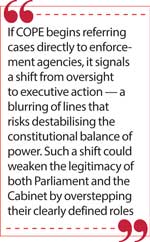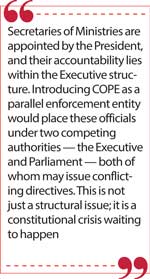Friday Feb 20, 2026
Friday Feb 20, 2026
Monday, 29 September 2025 00:20 - - {{hitsCtrl.values.hits}}

Strengthening COPE should mean better research support, stronger audit collaboration, and continuous capacity
building — not crossing the line into executive enforcement
 As someone who has been privileged to represent all three critical domains of the COPE process — as a Chairman of a State-Owned Enterprise (SOE), a Secretary of a Ministry, and as a Chair of COPE — I feel a strong sense of responsibility to express my concerns about the recent proposal put forward under Standing Order 137 by the current COPE Chair, Dr. Nishantha Samaraweera, MP (NPP).
As someone who has been privileged to represent all three critical domains of the COPE process — as a Chairman of a State-Owned Enterprise (SOE), a Secretary of a Ministry, and as a Chair of COPE — I feel a strong sense of responsibility to express my concerns about the recent proposal put forward under Standing Order 137 by the current COPE Chair, Dr. Nishantha Samaraweera, MP (NPP).
The motion seeks to amend Standing Order 120, granting COPE the authority to directly refer its findings to law enforcement bodies such as the IGP or the Commission to Investigate Allegations of Bribery or Corruption (CIABOC). While I appreciate the spirit of accountability that underpins the proposal, I must stress — with the full weight of my experience — that such a reform must be approached with great care, constitutional awareness, and institutional intelligence.
The separation of powers must be preserved
Our democratic system is based on a two-ballot mechanism — one for the Executive and one for the Legislature. The President and Cabinet are elected separately and entrusted with governing authority. COPE and other oversight committees are meant to act as watchdogs, not quasi-executive entities. They are part of the legislative process, designed to shine light on irregularities, not to enforce laws or initiate prosecutions.
If COPE begins referring cases directly to enforcement agencies, it signals a shift from oversight to executive action — a blurring of lines that risks destabilising the constitutional balance of power. Such a shift could weaken the legitimacy of both Parliament and the Cabinet by overstepping their clearly defined roles.
Competence of oversight committees: Political vs. Professional
Let us not forget that COPE is composed of Members of Parliament selected on political merit — not for their expertise in financial management, forensic accounting, or legal proceedings. It is questionable whether such a body is equipped to make prosecutorial referrals without compromising the principles of fairness, impartiality, and technical accuracy.
Do members possess the training to differentiate between administrative lapses and criminal negligence? Can their decisions be shielded from political motivation? These are uncomfortable but necessary questions.
A personal experience worth sharing
 Having served in all three domains — COPE Chair, Secretary, and SOE Chairman — I have seen the strengths and pitfalls of each. Let me share a practical example that highlights what can be achieved within the existing constitutional framework.
Having served in all three domains — COPE Chair, Secretary, and SOE Chairman — I have seen the strengths and pitfalls of each. Let me share a practical example that highlights what can be achieved within the existing constitutional framework.
When I was serving as Secretary of a Ministry, I was summoned before COPE, then chaired by D.E.W. Gunasekara. After a thorough discussion, he advised me to speak directly with the Minister and recommend the removal of a misbehaving Chairman of an SOE under our purview. I carried out that request, initiated a formal inquiry, and returned to COPE within 15 days with an update and documentary evidence of action taken.
The entire process happened without any constitutional confrontation. The roles were clear — COPE in oversight, the Executive in implementation, and the Secretary (myself) as the Chief Accounting Officer bridging the two. I don’t expect everyone to act exactly as I did, but this example proves that the system can work effectively, without needing COPE to act as an enforcement arm.
Dual accountability will create governance chaos
Secretaries of Ministries are appointed by the President, and their accountability lies within the Executive structure. Introducing COPE as a parallel enforcement entity would place these officials under two competing authorities — the Executive and Parliament — both of whom may issue conflicting directives. This is not just a structural issue; it is a constitutional crisis waiting to happen.
Public reputational damage and security risks
Let us not ignore the consequences of public perception. Simply announcing that a file has been referred to the IGP or CIABOC, even before any inquiry, could irreparably damage a public official’s reputation, family life, and career. In Sri Lanka, we have seen how media trials can convict people long before courts do.
Oversight should not translate into public condemnation. Let us not turn Parliament into a theatre of humiliation.
There must be an intermediate review mechanism
If there is genuine intent to enhance COPE’s authority, it must be coupled with the creation of an independent review panel. This panel — ideally composed of legal experts, senior retired administrators, and finance professionals — can vet cases and determine if legal referral is necessary. Such a mechanism will uphold due process, prevent politicisation, and protect public servants from unfair targeting.
Oversight, not overreach: COPE’s role must be protected
 COPE plays a critical role in our democracy. It brings transparency, questions misuse of public funds, and recommends corrective action. But its moral force comes from its non-executive character. If we transform it into a prosecutorial body, we risk undermining its credibility, independence, and practical utility.
COPE plays a critical role in our democracy. It brings transparency, questions misuse of public funds, and recommends corrective action. But its moral force comes from its non-executive character. If we transform it into a prosecutorial body, we risk undermining its credibility, independence, and practical utility.
Strengthening COPE should mean better research support, stronger audit collaboration, and continuous capacity building — not crossing the line into executive enforcement.
Final thoughts
Let me be clear: I am not against reform. I am against the erosion of constitutional boundaries.
As a person who has sat at the head of a ministry, run an SOE, and chaired COPE, I speak from a rare vantage point. Reforms must be intelligent, measured, and constitutionally sound. Otherwise, we risk creating an ungovernable state, where officers no longer know who to listen to — Parliament or the Executive.
I urge my colleagues in Parliament and members of civil society to reflect deeply on this proposal. Let us ensure oversight remains powerful, but not authoritarian. Let us preserve trust in governance, without compromising the dignity and safety of public officers.
Let us not confuse oversight with overreach.
(The writer was the chair Professor of Philosophy at the University of Peradeniya and a prominent public intellectual who has served Sri Lanka in multiple leadership and policy-making roles. He was a Member of Parliament and the former Chairman of the Committee on Public Enterprises (COPE), where he strengthened parliamentary oversight of state-owned entities. Prior to his tenure in Parliament, Dr. Herath served as Secretary to the Ministry of Mass Media and Information, Chairman of the Central Environmental Authority, and Chairman of a major state-owned enterprise. With decades of experience spanning academia, public administration, and legislative governance, he brings a unique perspective on the intersection of ethics, policy, and institutional reform in Sri Lanka.)